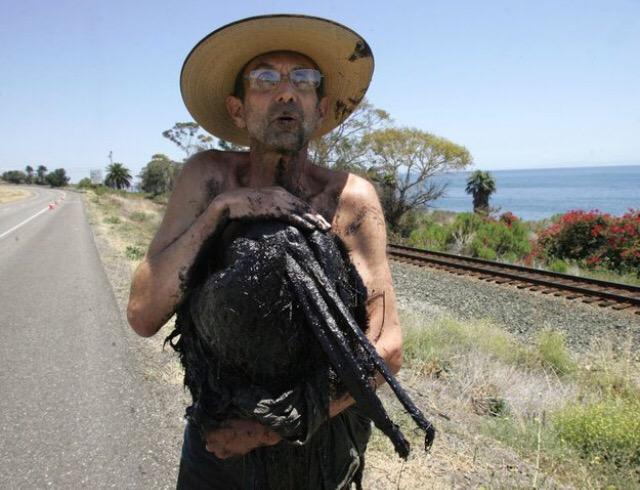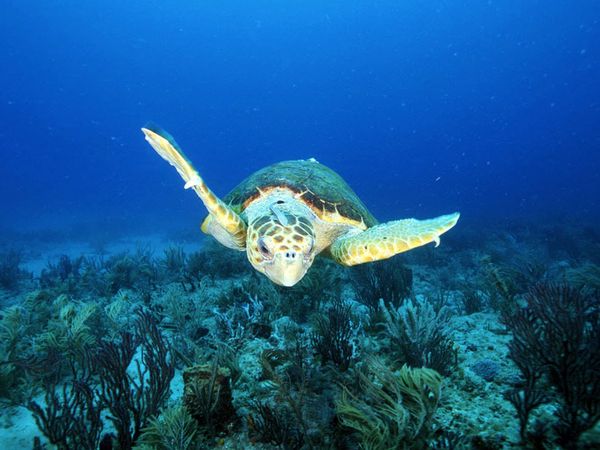-----------------------------------------------
2. KA-BOOM! Indonesia Sinks Foreign Fishing Boats
Indonesia has sunk 41 foreign boats that had been caught fishing illegally. The boats included one from China and a number from Vietnam, Thailand, and the Philippines. Indonesia has taken a firm stance on illegal fishing boats and practices and this is how the government defends that policy. Indonesian President Joko Widodo committed to protecting the country's fishing industry and maritime resources. Read more...
-----------------------------------------------
3. BP Oil Spill Caused Dolphins' Lung Disease
This week, a report was published in the journal PLOS ONE that linked the 2010 BP oil spill to the increase in bottlenose dolphin deaths on the Gulf coast. Because dolphins come up to the surface to breath, they end up being exposed to the most oil concentrated area of the ocean. Research shows that the dolphins that died after the oil spill actually had some distinct lesions on their lungs and adrenal glands. In addition to the abnormal adrenal glands, a high number of oil spill dolphins had bacterial pneumonia. Read more...
-----------------------------------------------
The European Environment Agency (EEA) published some shocking results in the recently published State of Nature in the EU report. After reviewing data on the Natura 2000- protected species and habitats over a 6 year period, the organization determined the following: 1) In the Atlantic, 71% of marine habitats are in unfavorable status, 2) In the Baltic, 86% of marine habitats and 80% of marine species are in unfavorable status, 3) In the Mediterranean, 62% of marine habitats and 56% of marine species are in unfavorable status. To view more detail and analysis that lead to these conclusions, read the full report here...
-----------------------------------------------
 This is certainly not a new topic to the Week in Review- the ice in Antarctica is melting rapidly. Last week we reviewed NASA's new finding that the ice shelves will actually melt completely by the end of the decade. This week, a group of British scientists uncovered a specific example of NASA's theory. On 67,000 square mile portion of the Antarctica Peninsula began melting in 2009. The ice melt from that location added approximately 55 trillion liters of water per year to the ocean. The question on everyone's mind right now- what triggered this melt in 2009? Read more...
This is certainly not a new topic to the Week in Review- the ice in Antarctica is melting rapidly. Last week we reviewed NASA's new finding that the ice shelves will actually melt completely by the end of the decade. This week, a group of British scientists uncovered a specific example of NASA's theory. On 67,000 square mile portion of the Antarctica Peninsula began melting in 2009. The ice melt from that location added approximately 55 trillion liters of water per year to the ocean. The question on everyone's mind right now- what triggered this melt in 2009? Read more...
-----------------------------------------------
6. Green Climate Fund is Open!
 Although the fund was off to a slow start, the UN's Green Climate Fund is now open. The goal of this fund is to provide financial backing for green energy projects in developing countries. After Japan's donation of $1.5 billion USD this week, the fund now has over half of what it has been promised to receive. There are still a number of countries who have pledged donations but have not completed them. Read more...
Although the fund was off to a slow start, the UN's Green Climate Fund is now open. The goal of this fund is to provide financial backing for green energy projects in developing countries. After Japan's donation of $1.5 billion USD this week, the fund now has over half of what it has been promised to receive. There are still a number of countries who have pledged donations but have not completed them. Read more...
-----------------------------------------------
7. 13 Great White Sharks Seen in Water Off Huntington Beach

Thirteen juvenile great white sharks were spotted off of Huntington Beach. Sharks have been spotted inching closer and closer to the shoreline. Could this be because the decreased species populations in the food chain have made it more difficult for sharks to find food? Read more...
-----------------------------------------------
 After 4 years of exploration and analysis, scientists found some important information on the small microbes living in the world's oceans. According to the study published in Science this week, temperature is the most important environmental factor for these tiny creatures. As one of the authors, Chris Bowler, states, " this would imply that climate change is going to have a strong impact on these organisms". There is still very little known about the marine microbes but, the 35,000 samples that were taken from this expedition will certainly help! Read more...
After 4 years of exploration and analysis, scientists found some important information on the small microbes living in the world's oceans. According to the study published in Science this week, temperature is the most important environmental factor for these tiny creatures. As one of the authors, Chris Bowler, states, " this would imply that climate change is going to have a strong impact on these organisms". There is still very little known about the marine microbes but, the 35,000 samples that were taken from this expedition will certainly help! Read more...
-----------------------------------------------
Be sure to "LIKE" http://facebook.com/SeaSave to ensure our "Week in Review" is delivered to your newsfeed every Thursday.
Sea Save Foundation is committed to raising awareness of marine conservation. The Week in Review is a team effort produced by the Sea Save staff to provide a weekly summary of the latest in marine research, policy, and news.

